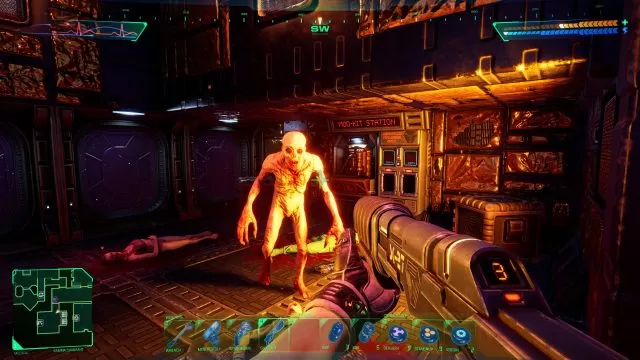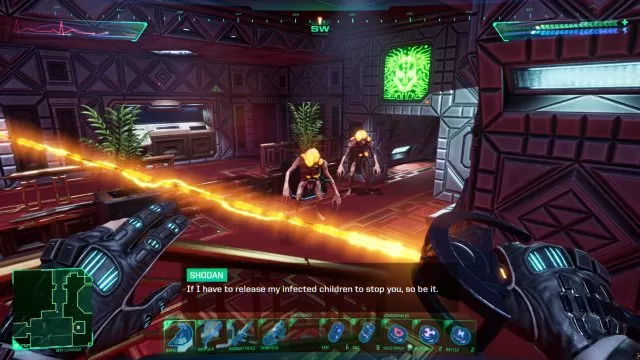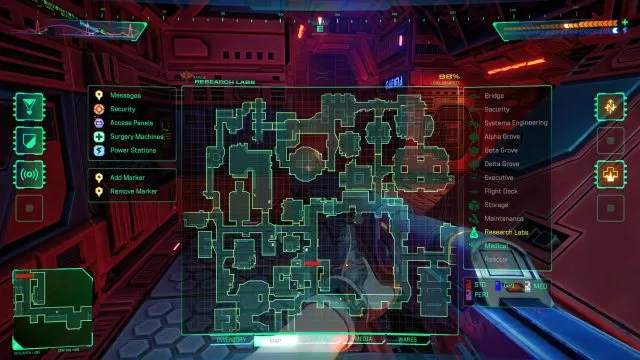System Shock Review – Remember Citadel
Imagine being a caveman hunting a mammoth with a flint-tipped spear and bone arrows. Suddenly, a bright light flashes, weirdly dressed stranger materializes in front of you and hands you a modern sniper rifle. Then, he fizzles back to the future. The object you are holding is incomprehensively sophisticated, never mind that those words haven’t been invented yet. The matte metal finish leaves you in awe, and the intricate mechanism invites you to figure it out. Should you try to use it or worship it on a pedestal? Tell everyone about it or tinker with it yourself? In any event, your horizons are irreversibly broadened.
Well, that was System Shock in 1994. compared to practically every first-person game back then. It came two years before Duke Nukem 3D and less than a month before Doom II. The pinnacle of modern shooters in the early nineties was the original Doom, a fun but crude festival of violence. System Shock was precisely that, a profound lightning bolt into the system which just began to experiment with building elementary 3D worlds. Objectively, it was at least a decade ahead of its time, but to me, it felt like an artifact from the twenty-second century. Calling it a “shooter” always felt like cutting it short. It was the first proper immersive sim, a clever hybrid between adventure, action, and survival. For a long time, it was one of a kind.
Don’t confuse it with System Shock: Enhanced Edition

Nighdive Studios was working on the System Shock remake since 2015, suffering all sorts of setbacks along the way. Previously, the studio developed System Shock: Enhanced Edition, a basic remaster of the original with added support for widescreen resolutions, a mouse look, and a few other quality-of-life enhancements. System Shock (2023) is a proper remake. It’s a total conversion of the core game, made in a modern engine and equipped with an updated interface. Remake remains true to the original, not only in spirit, but in concept and, if you will, underlying philosophy. This game demands the undivided attention of the player, being a complex, user-unfriendly beast of old. It’s far more tasking on the mind and deduction skills than its sequel. System Shock 2 was/is a modern game; Its predecessor wasn’t.
System Shock (2023) came at a perfect moment to exploit the modern zeitgeist and obsession with everything AI. It deals with the classic folklore fear of “mad” artificial intelligence, hell-bent on destroying humanity. The star of the show is SHODAN, an anthropomorphic AI that regulates all aspects of life in the Cidatel station, a massive corporate structure in Saturn’s orbit. As a hacker manipulated by one super-corrupted executive of TriOptimum Corp, you became responsible for disabling AI’s ethical restraints. Now SHODAN considers itself a God, trying to remake humanity into its own image. The self-deification agenda involves mining lasers, involuntary cyber surgery, and biological warfare. You must stop all this, of course, and redeem yourself from being a gullible tool.
Panting and sweating as you run through her corridors

Citadel Station is a massive structure, much bigger than I remember it. It’s a maze of metallic hallways, labs, and offices, crawling with SHODAN’s weaponized victims. Nightdive Studios opted to preserve the feeling of being helplessly lost by not holding the player’s hand. On the default difficulty setting (more on that later), you are expected to deduce your objectives by yourself. No arrow or breadcrumb trail is guiding you. Listening to audio logs, another invention by the developers of the original game that went into the mainstream, you must figure out what to do and where to go. For some players with, shall I say, “modern” sensibilities, this might prove to be a titanic challenge. There’s a lot of backtracking involved, and having a pen and paper handy for writing down a piece of code you might need fifteen hours from now is also recommended. Immersive sim, in this case, means immersing yourself in the un-ergonomic systems of the mid-nineties.
Exploration takes effort, but the combat is pretty basic. Mutants, cyborgs, and robots are in abundant supply, but your arsenal will be steadily growing in potency. Everyone’s favorite laser rapier makes a comeback, as well as plenty of ballistic and energy weapons. Resource management still suffers from limited inventory space, but Nighdive introduced a cargo lift in every deck, providing you with a repository for items, shared across the entire station. Another helpful innovation is recycling. Citadel is riddled with redundant trash that can be recycled for credits, which you can invest in weapon mods, cyberware, ammo, food, or whatever.
Modern relic of a bygone era

Before you begin the game, you have the option for separate difficulty levels regarding Combat, Mission, Cyber (space), and Puzzles. This ingenious idea allows you to tailor the combined experience to your preferences. On the easiest Mission level, for example, you will get an arrow pointing you to your next objective. I left everything on default, except for puzzles, which I had lovered to the easiest setting. Some of those are really freakin’ difficult, and you might need the brain resources for detective work and navigation.
System Shock (2023) follows a very nice artistic direction that’s both retro and modern, albeit it might be a bit on the nose with neon. Nightdive guys enlisted the help of Terri Brosius, the original voice of SHODAN, who did tremendously good work. SHODAN is delightfully weird, taunting your sorry ass every chance it gets. It definitely stood the test of time as a penultimate villain.
Will you have the patience necessary to bring System Shock to its conclusion? I would say that most players might not. Even the veterans of the original are hopelessly spoiled by decades of modern games and the ever-increasing trend of user-friendliness. System Shock requires twenty to thirty hours of intense effort, and you can’t just drop it for a few weeks hoping to finish it up later. If you lose continuity, you might as well uninstall it.
System Shock is a modern relic of a bygone era. It requires patience, determination, and a healthy dose of nostalgia. You need to work to make it work. If you are cool with that, you owe yourself to deep dive into it.
Highs
- Quality remake of the progenitor of the immersive sim genre.
- Separate difficulty levels for different game systems is an excellent idea.
- Terri Brosius is back as SHODAN!
Lows
- You will get tired of metallic corridors long before you reach the end.
- Cyberspace sections are tiresome.

